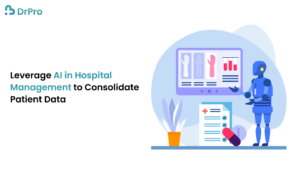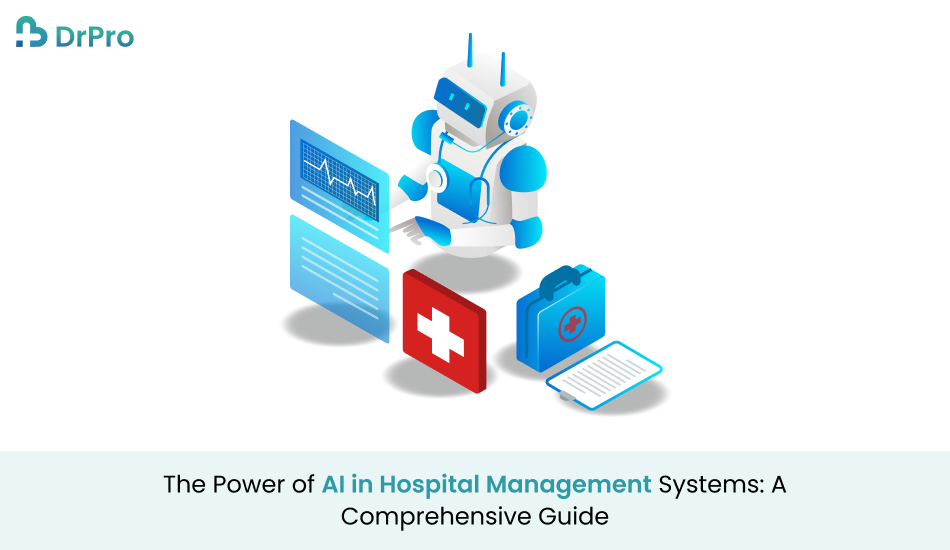Quick Summary
The applicability of AI in Hospital Management is fast increasing across the globe with particular emphasis on enhancing new systems and efficiency in the working of hospitals. Below, this guide provides information on what AI entails, how it works in the management of hospitals, real-life examples, the benefits of AI in Hospital Management, and not-to-miss features. Due to impressive tasks in arranging patient flows, minimizing errors, and improving decision-making, AI helps hospitals function better.
Introduction
In this paper, the author discusses how the healthcare industry is relying on technology to deal with the ever-expanding aspects of the hospital organization. With the development of medical science, there is always the need to reduce costs by increasing productivity in treating patients and minimizing the Resources wasted. These needs are well served by a good HMS, but the current application of AI in Hospital Management brings in the possibility of these systems.
In the management of hospitals, AI has been incorporated in different areas of hospitals ranging from diagnosing a patient to administrative work. Organizations may benefit from it to automate current functions, predict patient outcomes, and manage resources. AI is a tool that when integrated with traditional hospital AI in Hospital Management provides the hospital with an added advantage in delivering quality services with little or no consideration of operational costs.
This extensive tool-providing guide explores the emerging changes that AI in Hospital Management, its functions, and advantages to healthcare organizations, personnel, and consumers.
A Brief on Hospital Management Systems
A hospital management system usually refers to the computerized system that is used to manage a hospital or other healthcare institution. Some of the capabilities that are covered in the solution are; patient record management, appointment management, medical billing, human resource management, inventory management, and others. Originally, many of these systems required manual data input which is time-consuming, error-prone, and overly bureaucratic. These activities can therefore be enhanced in the managerial domain of AI in Hospital Management.
The main objectives of a Hospital Management System are:
- To store and manage patient data securely.
- To improve the efficiency of hospital operations.
- To streamline communication between departments.
- To reduce the workload on hospital staff.
- To ensure compliance with healthcare regulations and standards.
While HMS systems have existed for several decades, the incorporation of AI in hospital management is a relatively recent development, opening up new avenues for hospital administration and patient care.
AI in Hospital Management: Uses, Examples, and Benefits

Significantly, it is becoming more and more apparent that artificial intelligence in hospital management is no longer a concept on the horizon. It is a reality of today’s world, already affecting the functioning of hospitals in some way. The use of AI in the healthcare sector can be summed up in the following areas: Predictive analytics and workflow.
Appreciation and Impacts of AI in Hospitals
AI in hospital management can be applied across a wide range of functions:
Predictive Analytics:
Machine learning algorithms can then take this patient’s data and compute the prognosis of their situation thus being able to predict readmission or other complications that a patient can experience. This way it becomes easier for the hospitals to allocate their resources.
Medical Imaging Analysis:
The latest breakthrough technology includes the utilization of artificial intelligence in the diagnosis of medical images such as X-rays, CT scans, and MRI scans.
Electronic Health Records (EHR) Management:
AI facilitates the enhancement of EHRs since there is little or no need for manual entry of data because the risks involved are minimized.
Chatbots for Patient Support:
Chatbots that use artificial intelligence can help patients any time of day and help them set an appointment with a doctor or suggest what might be wrong with them based on their symptoms.
Virtual Assistants for Doctors and Staff: He explained that a virtual assistant analysis can be extremely valuable for health care specialists if it can assist with administrative work like appointment scheduling, note taking, and data search – so the assistant would leave more time to focus on patients.
Real-World Examples of AI in Hospital Management
IBM Watson Health:
There have been several hospitals across the globe where IBM’s Watson has been used for purposes of diagnostic findings of diseases as well as prescription. Doctors use AI in hospital management to search for the required medical info and analyze the received information about patients.
Google DeepMind:
Google’s DeepMind AI company has been partnering with hospitals in the UK to foresee when patients with kidney injuries will get worse. The AI system employs patient records, and lab results to give early signals to the engagement of the healthcare givers to avert complications.
Zebra Medical Vision:
This AI tool makes analysis of medical imaging data and offers physicians accurate diagnostic information. Its purpose is to improve radiology departments through the use of artificial intelligence in providing accurate interpretation of radiology images for disease diagnosis.
Benefits of AI in Hospital Management
Improved Efficiency:
When applied to healthcare, particularly in hospitals, AI relieves health practitioners from relentless paperwork.
Enhanced Decision Making:
There is a benefit of cutting down the time that a doctor or a healthcare provider will spend sorting out data or data on a patient in question.
Error Reduction:
One of the potential benefits of incorporating and implementing AI in hospital management, for instance, is that the risk of errors in data handling such as wrongly taking records or recording wrong patients’ information is considerably reduced as many tasks such as data entry are automated.
Cost Reduction:
AI can help the hospital to reduce costs which in turn increases its efficiency through proper utilization of the available resources, low rates of readmissions, and low operational cost.
Better Patient Outcomes: By applying predictive analytics or early detection, AI in hospital management can be useful in the early detection of these complications and hence early intervention will be made thus reducing the growth of complications.
Top Features of AI-Enabled Hospital Management Systems
Features of Management Systems in hospitals include the following; Some of the key features include:
Automation of Administrative Tasks
It can be understood that the process of automation of administrative tasks is really important.
Compared to other areas, the leadership of the hospitals has noted that AI in hospital management can be used to quickly accomplish administrative responsibilities inclusive of admission, appointment, and billing services. This relieves the staff in the hospital some task load hence making the processes to be carried out more effectively.
Predictive Analytics
AI applications in the modern HMS leverage predictive analytics that work based on one’s past behavior. For instance, admission rates can be accurately estimated by hospitals in relation to certain trends, in order to better manage resources. It can also pinpoint those patients who will be most likely to be readmitted, and therefore care can be taken.
NLP (Natural Language Processing)
NLP incorporation in the use of AI in hospital management enables systems to work with voice commands from humans owing to its ability to analyze human language. This feature works well when one needs to call up the patient’s record or enter new information in the system without having to search through the menus.
Real-Time Monitoring
AI systems thus have the potential to constantly supervise patient status, assess the values of physiological patterns, and signal the members of the health care team in the event of novelties. This eliminates delays which in critical situations can lead to many deaths.
Decision Support Systems or DSS
Diagnostic and treatment advisory are obtained with the support of AI Decision Support Systems in healthcare markets. They scrutinize thousands of pages of medical literature and patients’ records to offer not only relevant but as relevant as possible information.
Leverage AI in Hospital Management to Consolidate Patient Data

Perhaps one of the biggest problems in the world of healthcare is the issue of data aggregation and integration. Hospitals have large throughput and store various kinds of data including patient records, lab tests, images, etc. AI in hospital management provides strong information management tools for gathering and analyzing these data systematically.
Unified Data Storage
AI in hospital management can compile data from various sources into one system. This makes it easy for the healthcare providers to see all the information about the patient on one page which makes work easy and reduces the likelihood of making mistakes because information is scattered.
Data Normalization
Hospital management can also use AI to standardize patient data and make overall information from different resources more or less similar. This is especially important in healthcare where different formats of data can yield differences in diagnosis or treatment regimes.
Advanced-Data Analysis
In the management of a hospital, AI can handle lots of data received continuously from the patients and put it through an analysis that humans might not easily detect. This is particularly important for long-term patients where monitoring of changes in the patient status can improve patients’ prognosis.
Data Security and Privacy
The current HMS systems powered by artificial intelligence are developed with adequate consideration of security measures to avoid violation of patient information. By using machine learning, the system can identify trends of data access that can be unusual and notify the administrators of such occurrences.
Conclusion
AI present in the management of hospitals can dramatically change the hospital systems and make changes to the healthcare system by making it efficient, accurate, and accessible. AI-embedded HMS systems have enhanced the operational models of hospitals by minimizing the redundancy that comes with daily routine tasks, minimizing errors, and improving decision-making. AI adoption in the hospital will not only be an efficient tool for the management but it will also help better the conditions and treatment for patients.
AI shows slow but steady progress, thus, it is without a doubt that in the future of healthcare, the integration of this technique will be even more distinctive. Smart healthcare has detected that hospitals that adopt AI in their operations today will be ready for the future challenges of delivering better quality healthcare at a cheaper price.
Together, ProjectTree and DrPro offer a powerful integration that enhances productivity and effectiveness across project management and healthcare sectors.
FAQs
1. How does AI improve hospital management systems?
AI in hospital management enhances systems by automating routine tasks, improving decision-making through predictive analytics, and reducing errors. It helps streamline operations, manage patient data efficiently, and optimize resource allocation.
2. What are the main challenges in implementing AI in hospital management?
Some challenges include the high cost of implementing AI systems, ensuring data privacy and security, and the need for staff training to effectively use AI technologies.
3. Can AI replace doctors and healthcare professionals?
No, AI in hospital management cannot replace doctors, but it can assist them by providing data-driven insights, automating administrative tasks, and offering decision support. It helps healthcare professionals focus on delivering better patient care.
4. What is the role of AI in patient data management?
AI in hospital management helps in consolidating patient data from various sources, ensuring data consistency, and analyzing data for patterns that assist in diagnosing and managing diseases. It also ensures data security through advanced monitoring systems.
5. What are some examples of AI applications in hospital settings?
Examples include IBM Watson Health for diagnosing diseases, Google DeepMind for predicting patient deterioration, and Zebra Medical Vision for AI-driven radiology interpretations. These systems improve diagnosis accuracy and operational efficiency.


